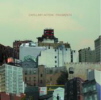 Theseare the first steps of a band with a definite goal in mind and thoughsome of those steps are awkward, Capillary Action harnesses the abilityto fuse the wide, wide world of music into something new and exciting.Just so long as they don't screw up and write more tunes like"Scattered Remnants."
Theseare the first steps of a band with a definite goal in mind and thoughsome of those steps are awkward, Capillary Action harnesses the abilityto fuse the wide, wide world of music into something new and exciting.Just so long as they don't screw up and write more tunes like"Scattered Remnants."Pangaea
For an album titled Fragments a whole lot of attention has been focused on how varied every song is. It's funny because I thought nothing of it the first time I listened to the record. The scope and ambition of the project is immediately evident as Jonathan Pfeffer and company move from metal to indie instrumentalism to jazz in five songs or less.
Before the third track had finished I still wasn't hip to exactly what Pfeffer was trying to do with Fragments. I had assumed that most independent musicians went through a stage where any and all styles of music were fair game; who says samba and metal shouldn't make an appearance on the same tune? As the record continued, however, clarity struck and Pfeffer's strengths and weaknesses were simultaneously exposed. Pfeffer and the musicians who contributed to the record are all talented, capable of playing a wide range of styles, switching between them flawlessly, and blending them together to form whole songs. On the other hand, they sometimes sound a little stiff, the songs coming across awkwardly as if the band only had experience with playing songs of this type, not necessarily writing them. This awkwardness wouldn't have been half as obvious if it weren't for the fact that Capillary Action sound most natural when metal is the name of the game. Want harmonized riffs, double bass drum action, and 80's flair? Capillary Action know how to play that game and they play it as well as any of the long-haired stars of the genre. Want the chugging riffs of dark, epic metal? Capillary Action can do that, too, and they add a believable and sophisticated dimension to it simultaneously.
So when "Scattered Remnants" starts and Pfeffer tries toying with pseudo-lounge arrangements there's just a hint of unease in the recordings. At times Pfeffer tries to introduce some classic instrumental tricks to cover that shakiness: drums chugging away like trains beneath repeated lines of melody, arrangements involving multiple layers of guitars all playing different rhythms in a sort of multi-instrumental loop, sudden stops in favor of radically different sections of music... all of them are employed at some point on the record and they sound out of place when played next to songs like "A Hundred Pages of Cannot Be Named" or "Architecture Would Fail." Pfeffer knows he wants to explore, but he doesn't always seem to be on sure ground when he does it.
Once "Scattered Remnants" exhausts its eight minute duration, Fragments loosens back up into a Latin dance that doesn't seem so forced. From there the album goes through shades of fun, excellent, good, and wanton exploration. Without ever settling on a signature sound, Capillary Action manage to carve out a mission statement: we're going to go where we want, even if that means doing something out of the ordinary and completely uncomfortable. It's a daring statement because the band would do well to calm down and try finding some coherent sound to work through on one album instead of writing ten different records and condensing them into one package.
Fragments has me thinking and I like that. If aband's goal is to experiment and play around with styles, then the bandshould go for broke. That's exactly what Capillary Action does. Screwall theattempts at meshing genres together, Pfeffer is going to force theminto the same space and if he doesn't succeed entirely, then he's happythat he at least gave it a shot. It's hard to fault a band that isn'tafraid to chase their vision into unusual realms. They aren't evenafraid to screw up, which they do here and there. More focus, lesswank, and a bit of experience is going to do a lot for CapillaryAction. Whether or not they'll learn to harness all their influenceswill decide whether or not they make a name for themselves.
samples:
Read More

